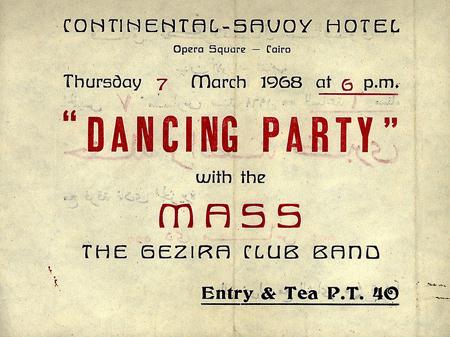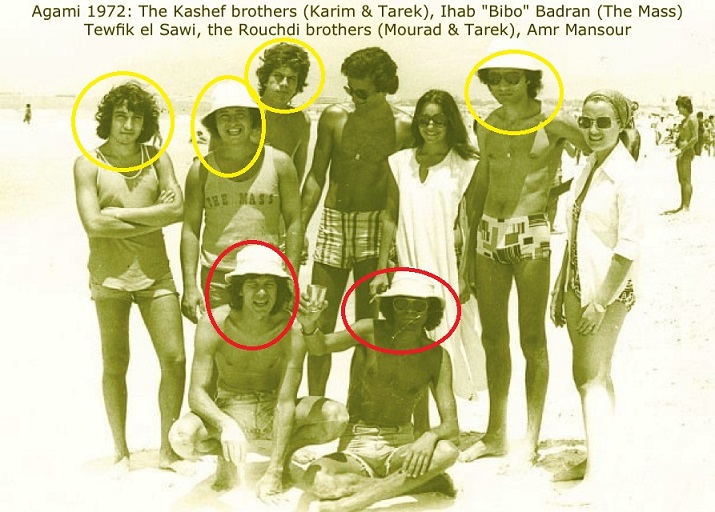THE MASS
From The 60's Music SceneSamir Raafat
Egyptian Mail, October 4, 1997


Years later: Murad Rouchdi and Amr Mansour two leading members of The Mass in red circle and groupies in yellow
|
|
|
|
|
|
EGY.COM - PERSONALITIES
|
|
Samir Raafat
Egyptian Mail, October 4, 1997


Years later: Murad Rouchdi and Amr Mansour two leading members of The Mass in red circle and groupies in yellow
A YEAR, almost to the day flashed by since the passing of Mohammed Shebl. Remembered mostly as a striving film director and popular radio talk-host, few knew him as the artistic director of The Mass, Egypt's celebrated pre-punk '60s pop band. While Shebl himself neither played or composed music, he was the definitive authority on Beatlemania. And in the days when The Mass had all the trappings of a rave R&B band, Shebl liked to see himself as its Brian Epstein -- Epstein of-course being the notorious manager of the Beatles.
The Mass was co-founded in 1965 by Mourad Rouchdy and Ali Hazzah, two gangly teenagers who grew up in the shadow of Gezira Sporting Club and French language schools. Both had British mothers. While blameless and clean cut when compared to their opposite numbers on Carnaby Street or Woodstock, in a sense, Mourad and Ali were Cairo's original habbies (Hippies), having picked up the new mood early on in London. The reason why they chose the name The Mass had nothing to do with physics or subterranean Catholic leanings; it was simply the first letter of the founders names: Mourad and Ali, with the 'S' belonging to a certain Mohammed Sadek a.k.a. Sos, who had a remarkable voice and whose singing career spanned all of two months.
When Mourad and Ali started The Mass, the only local competition was Mediterraneo muzak (Enrico Marcias, Pepino de Capri etc.) mimicked by groups like Les Petits Chats and the BlackCoats. More daring and less commercially minded, The Mass initially played hard core rhythm & blues with lots of Stones and Animals thrown in. Considered at the time the more talented members of the band, Mourad and Ali wrote some good early tunes. Had they stayed together, who knows, they might have become the Jaegger / Richards of the Arab world!
When they looked for another guitarist, Mourad's mother suggested the brother of one of the girls she gave English Private lessons to. Her name was Amina Salmawy. When Ali and Mourad auditioned Ashraf, he brought along a quiet, shy boy called Tarek "Ricky" Nour. It was 'shy-guy' Ricky who shortly after suggested the band bring in a drummer called Marwan Hammad (a future radio Cairo DJ), but in a hastily arranged meeting at the Gezira Club, Ali and Mourad insisted on keeping Amr Mansour, the band's original percussionist.
Thirty five years later, Ali, now a New York executive, remembers how in their teens, Mourad and Amr spent many hours over many many months practicing at his place at No. 3 al-Fardos Street, Zamalek. Living in the apartment directly below Ali's was the Arab Worlds' uncontested crooner/composer al-musicar Mohammed Abdel Wahab. "We could hear his orchestra at midnight rehearsing. Conversely, Abdel Wahab could hear us play our electric guitars." Rather than fuss over loud twangs and incessant thumping, the well-mannered Abdel Wahab occasionally complained to Mrs Hazzah about the little footsteps that Ali's brothers would make when running about during siesta hour.
When Abdel Wahab's famous composition of 'Inta Omri' was performed for the first time in Cairo, Um Kalthoum's adoring public was quick to note that the maestro had made good use of the electric guitar. "The new sound" concedes Ali, "was most probably happenstance or musical coincidence." Nevertheless, Ali was amused that after having spent some time perfecting a particular riff on his balcony which was directly above Mohammed Abdel Wahab's bedroom, the maestro had come out with a new song that featured an extended electric guitar intro. "I am not implying that Abdel Wahab borrowed that riff, but simply that he had possibly -- for the first time -- envisioned the possibility of a melody played by an electric guitar." Although Ali failed to mention it, it is well known that Abdel Wahab had on several occasions freely borrowed melodies from European classics.
Because Ashraf Salmawy and Tarek Nour were four or five years older than Mourad and Ashraf, they were considered the band's 'elders'. In that period in one's life, a year or two either way made a huge difference. The newcomers liked what they saw and admired the 'juniors' musical equipment particularly Ali's big red amp, nicknamed 'The Computer' and which Ashraf later bought. There was also Mourad's cool Vox amp and Ali's six-string Hofner. As for Amr Mansour's rickety drum set, it was nothing to write home about. The rest of the instruments, were cheap Woolworth type electric guitars plus a junky organ. Despite their rough-and-tumble props, the band could whip up a young crowd and sing. And sing hit tunes The Mass most certainly did, much to the joy of the first ever generation of Zamalek and Maadi groupies.
Cairo's hippies in various degrees of beads, stringy hair and pointed high heel shoes adored The Mass and showed it. At every concert they turned up en masse screaming and shouting. The animate group was their direct link to the throbbing music scene in Europe and America. It was during these pop concerts that they could vent out their adolescent confusions, excitement, anger and pain. And so it all started in the middle of Winter 1965-66 when The Mass started playing gigs at AUC and private parties. On one of their earlier gigs the band was paid a bottle of whisky which Ashraf and Ricky promptly finished -- "a bit of Mass trivia few know about" says Ali.
With each new gig, The Mass's popularity soared and the audience swelled. Yet, soon enough, confrontation started to brew internally over the Beach Boys croony type of music that Ashraf and Ricky favored (Tarek Nour's high voice and falsetto was suited to that), while Mourad and Ali were into grittier stuff.
Having spent several summers in London hitting the Clubs, including the Kinks and the Hollies, Mourad and Ali were heavily influenced by British music -- but not the Beatles. Mohammed Shebl, who eventually became the group's PR, social secretary and unofficial spokesman and whatever else which had to do with publicity, would invariably become the band's resident Beatles expert. He made sure that any one gig was heavily laden with songs by Lennon, Harrison and McCartney. Shebl also insisted on putting out a fan club and a magazine that cost The Mass a couple of nights' earnings and was the cause of some resentment within the group. "However, looking back on the magazine today with one's children, it was 200 LE well spent!" says former Mass lead guitarist Mourad Rouchdy who now resides in the Gulf.
The Mass's official outing could be attributed to the hugely successful 1966 Christmas concert at the Gezira Club. From then on it was the music gravy train for this first 'all-Egyptian albums band'. Each month there was a choice of dance or concert. The most popular venue was the Cosmopolitan Hotel ballroom and the live concerts at any one of Cairo's sporting clubs. And then there was the annual talent show at AUC's Ewart Hall. Summers found the Mass playing in swinging Agami either at the Palace or Chez Georges. The Mass would become Cairo's pop icon of the mid '60s.
Ali's immigration to the United States in early 1967 made it possible for Ricky and Ashraf to take over. By then Ricky had adopted his Mick Jaegger look that would follow him into adulthood, when, as the successful Americana advertising agency boss, he would make himself into a kind of logo.
Almost thirty-five years later, and London-based Salmawy is the only member of The Mass who still plays music, performing in various London bars and supper clubs. The group's original leader, Ali Hazzah, is an executive in the New Media Division of a major national telecom firm headquartered in New York. Former 'Shy-guy' turned 'Tricky Ricky' Tarek Nour, Ali's self-driven successor and for a time the band's unofficial leader, is also in media. His trademark western jingles turned his company - Americana - into the hottest advertising agency in Egypt. The tall lanky Mourad Rouchdy, who swayed so many faint hearts as he strummed his guitar, staring at the crowds from behind Blues Brothers glasses, immigrated to Canada but is today a senior consultant in the Gulf.
The Mass also had its share of tragedies. Sometime in the 1970s, the group's jumping Jack prankster Amr Mansour took a bad fall in the Cub Med swimming Pool. He spent many years completely paralyzed as a result. He died in the 1980s while an In Patient at the Nour And Amal Rehab Center. Mohammed Shebl, faithful to the Beatles until the end, died unexpectedly on October 2, 1996, as he was putting the finishing touches to a documentary which he had just directed.
|
Reader Comments |
|
|
|
|
|